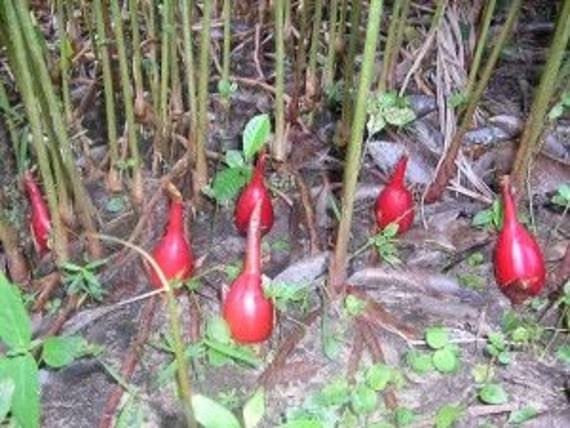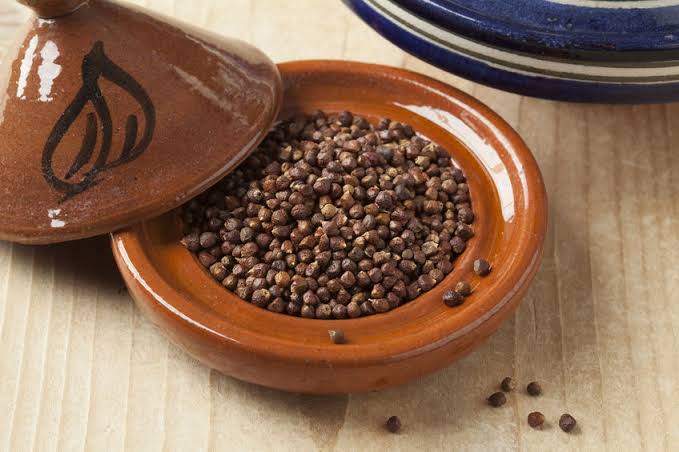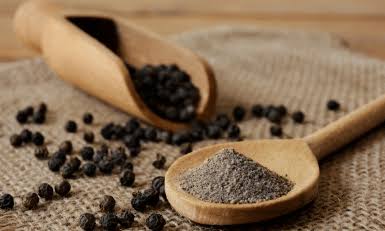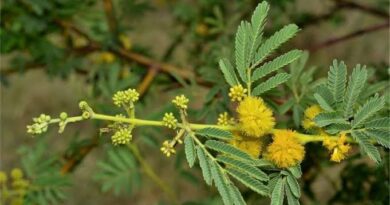Growing Guide and Health Benefits of Alligator Pepper
Alligator Pepper is a special spice that many people enjoy using in their cooking. It’s not like the peppers you might put on a pizza or in a sandwich. Alligator Pepper is unique, and it has a long history of being used in various ways.
Alligator Pepper comes from a plant that grows in parts of West Africa. The scientific name for this plant is Aframomum melegueta, but most people just call it Alligator Pepper because of its appearance. The pods of this plant look a bit like small alligator scales, hence the name.
People in West Africa have been using Alligator Pepper for a very long time. They use it to add flavor to their food, and it has a spicy, pungent taste. When you bite into a piece of Alligator Pepper, you’ll feel a warm and tingly sensation on your tongue. Some people even say it’s a bit like a mix of black pepper and ginger.
But Alligator Pepper isn’t just used for cooking. It has many other purposes too. In some cultures, it’s considered to have medicinal properties. People believe that it can help with digestion and ease stomach problems. Others think it can boost your energy and make you feel more alert.
In some parts of West Africa, Alligator Pepper is also used in traditional ceremonies and rituals. It’s often seen as a symbol of hospitality and friendship. When you visit someone’s home, they might offer you a piece of Alligator Pepper as a gesture of goodwill.
The way Alligator Pepper is used can vary from place to place. Some people grind it into a powder and use it as a spice in their cooking. Others chew it directly to enjoy its spicy flavor and potential health benefits. It’s also used in traditional herbal medicine, where it’s believed to have healing properties.
One interesting thing about Alligator Pepper is that it contains compounds that researchers have found to have potential health benefits. These compounds include antioxidants, which can help protect your body from damage caused by harmful molecules called free radicals. Some studies suggest that Alligator Pepper might have anti-inflammatory and antimicrobial properties too.
In addition, Alligator Pepper is a unique and flavorful spice that has been cherished in West Africa for generations. Its spicy taste and potential health benefits make it a valuable ingredient in both cooking and traditional medicine. Whether you want to add a kick to your dishes or explore its cultural significance, Alligator Pepper is a fascinating and versatile spice.
Read Also: The Different Breed of Goats – Diary and Meat Goats
How to Grow and Care for Alligator Pepper

Growing and caring for Alligator Pepper plants can be a rewarding experience. These plants, also known as Aframomum melegueta, are native to West Africa and are known for their flavorful and unique peppers. Here are some simple steps to help you grow and care for Alligator Pepper:
1. Choose the Right Location: Alligator Pepper plants thrive in warm and humid conditions. Select a location in your garden that receives partial shade to full shade, as direct sunlight can scorch the plants. Ensure that the soil is well-draining and rich in organic matter.
2. Planting Alligator Pepper: Alligator Pepper is usually grown from rhizomes, which are underground stems. You can obtain these rhizomes from a nursery or from an established plant. Plant the rhizomes about 1 to 2 inches deep in the soil, leaving some space (around 2 to 3 feet) between each plant to allow for proper growth. Water the newly planted rhizomes thoroughly.
3. Watering: Alligator Pepper plants require consistent moisture. Keep the soil evenly moist, but avoid overwatering, as they don’t like to sit in waterlogged soil. During dry periods, water the plants deeply, but allow the top layer of soil to dry out between waterings.
4. Fertilizing: Use a balanced, slow-release fertilizer to nourish your Alligator Pepper plants. Apply the fertilizer in the spring and again in mid-summer. Be mindful not to over-fertilize, as this can harm the plants. Follow the instructions on the fertilizer package.
5. Pruning and Maintenance: Prune your Alligator Pepper plants as needed to remove dead or damaged leaves and encourage healthy growth. Mulch the base of the plants to retain soil moisture and suppress weeds.
6. Harvesting: Alligator Pepper plants typically take a year or more to produce their signature peppers. The pods turn from green to red when they are ripe and ready for harvest. Harvest the peppers by cutting the pods from the plant using sharp scissors or pruning shears.
7. Pest and Disease Control: Keep an eye out for pests like aphids and mealybugs, which can sometimes affect Alligator Pepper plants. If you notice an infestation, treat it with organic pest control methods or insecticidal soap. Proper care, including good air circulation and avoiding overcrowding, can help prevent fungal diseases.
8. Winter Protection: In regions with colder winters, Alligator Pepper plants may need protection from frost. Consider bringing potted plants indoors or providing them with frost blankets or cloths.
By following these care guidelines, you can successfully grow and enjoy the unique flavor of Alligator Pepper in your garden. Remember that these plants require patience, but the reward of harvesting your own flavorful peppers is well worth the effort.
13 Health Benefits of Alligator Pepper

Alligator Pepper, also known as Aframomum melegueta, is not just a flavorful spice, it also offers potential health benefits due to its chemical composition. Here are 13 health benefits associated with Alligator Pepper:
1. Digestive Aid: Alligator Pepper is believed to aid digestion by stimulating the production of digestive enzymes, which can help alleviate indigestion and bloating.
2. Anti-Inflammatory: Compounds in Alligator Pepper may possess anti-inflammatory properties, potentially reducing inflammation in the body.
3. Antioxidant Rich: Alligator Pepper contains antioxidants that can help protect cells from damage caused by free radicals, potentially lowering the risk of chronic diseases.
4. Pain Relief: Some people use Alligator Pepper for pain relief, especially for conditions like headaches and joint pain.
5. Blood Sugar Control: Preliminary studies suggest that Alligator Pepper may help regulate blood sugar levels, which is beneficial for individuals with diabetes.
6. Antimicrobial: Compounds in Alligator Pepper may exhibit antimicrobial properties, helping to fight off harmful bacteria and fungi.
7. Weight Management: The spice’s potential ability to enhance metabolism could aid in weight management efforts.
8. Aphrodisiac: In some cultures, Alligator Pepper is considered an aphrodisiac, believed to enhance sexual desire and performance.
9. Respiratory Health: Alligator Pepper’s warming properties may provide relief from respiratory issues like colds, coughs, and congestion.
10. Anti-Arthritic: Some individuals use Alligator Pepper to ease the symptoms of arthritis, thanks to its potential anti-inflammatory effects.
11. Cardiovascular Health: It may help improve heart health by potentially reducing cholesterol levels and supporting overall cardiovascular function.
12. Stress Reduction: Alligator Pepper is sometimes used to reduce stress and anxiety due to its warming and soothing properties.
13. Immune Support: The antioxidants and anti-inflammatory compounds in Alligator Pepper may contribute to a strengthened immune system.
It’s important to note that while these potential health benefits are promising, more scientific research is needed to fully understand the extent of Alligator Pepper’s effects on health. Additionally, individual responses to this spice may vary, and it should be consumed in moderation as part of a balanced diet. Always consult with a healthcare professional before incorporating new herbs or spices into your wellness routine, especially if you have underlying medical conditions or are taking medications.
Read Also: Ways to Maintain a Healthy Goat Farming Practice
Uses of Alligator Pepper

Alligator Pepper, known for its unique flavor and potential health benefits, has a variety of common uses in different culinary and cultural contexts. Here are eight common uses of Alligator Pepper:
1. Culinary Spice: Alligator Pepper is primarily used as a spice to add a distinctive, pungent, and spicy flavor to a wide range of dishes. It is a key ingredient in many traditional West African recipes, such as soups, stews, and sauces.
2. Seasoning Soups and Stews: In West African cuisine, Alligator Pepper is often used to season and enhance the flavor of soups and stews, including popular dishes like Egusi Soup and Pepper Soup.
3. Flavoring Rice and Grains: Alligator Pepper can be added to rice dishes, grains like millet or couscous, and even to jollof rice for an extra layer of flavor.
4. Marinades: Ground or crushed Alligator Pepper can be used in marinades for meats and seafood, infusing them with a spicy and aromatic essence before cooking.
5. Traditional Medicine: In some cultures, Alligator Pepper is used in traditional herbal medicine. It is believed to have various health benefits, including aiding digestion and relieving certain ailments.
6. Chewing for Refreshment: Some people enjoy chewing Alligator Pepper pods directly for their spicy flavor and potential stimulant effects. It is also used as a natural breath freshener.
7. Rituals and Ceremonies: Alligator Pepper has cultural and ceremonial significance in some West African societies. It is often offered as a symbol of hospitality and goodwill during rituals, weddings, and important gatherings.
8. Beverages: Alligator Pepper can be used to flavor beverages such as herbal teas or alcoholic infusions. It adds a unique spiciness and warmth to the drinks.
While Alligator Pepper is versatile and widely appreciated, its usage may vary depending on the region and culture. Always use it in moderation, as it has a strong flavor, and adjust the quantity to suit your personal taste preferences when cooking or seasoning dishes.
Arbol Pepper

Arbol Pepper is a kind of chili pepper that’s known for being quite spicy. It’s a small, thin pepper that’s often used in Mexican and Latin American cuisine. People like to use it to add some heat and flavor to their dishes.
These peppers get their name from the Spanish word “árbol,” which means tree. They grow on tall, bushy plants that can reach up to six feet in height. The peppers themselves are usually bright red when fully ripe, and they have a slender, elongated shape.
Arbol Pepper is loved for its spicy kick, but it’s essential to use it with caution because it can be very hot. The heat comes from a compound called capsaicin, which is found in varying amounts in all chili peppers. If you’re not used to spicy foods, be careful when handling Arbol Peppers and wash your hands thoroughly afterward to avoid getting the spicy oils in your eyes or on your skin.
People use Arbol Pepper in many different dishes. It’s often dried and then crushed into flakes or ground into a powder to make red pepper flakes or chili powder. These spicy condiments are used to season foods like pizzas, pasta, and Mexican dishes. Arbol Pepper can also be used in salsas, hot sauces, and marinades to give them a fiery flavor.
In Mexican cuisine, Arbol Pepper is a key ingredient in making traditional dishes like salsa de árbol, which is a spicy red sauce. This sauce is used to add flavor and heat to tacos, grilled meats, and other Mexican dishes.
Besides adding spice to your food, Arbol Pepper may also have some health benefits. Some people believe that the capsaicin in these peppers can help with pain relief, boost metabolism, and even provide a temporary mood lift. However, it’s important not to overdo it with spicy foods, as they can cause discomfort for some individuals.
In addition, Arbol Pepper is a fiery and flavorful chili pepper that’s a staple in Mexican and Latin American cuisine. While it’s famous for its heat, it can add a unique and exciting dimension to a wide range of dishes when used in moderation.
Read Also: The Impact of Composting Business Ideas









